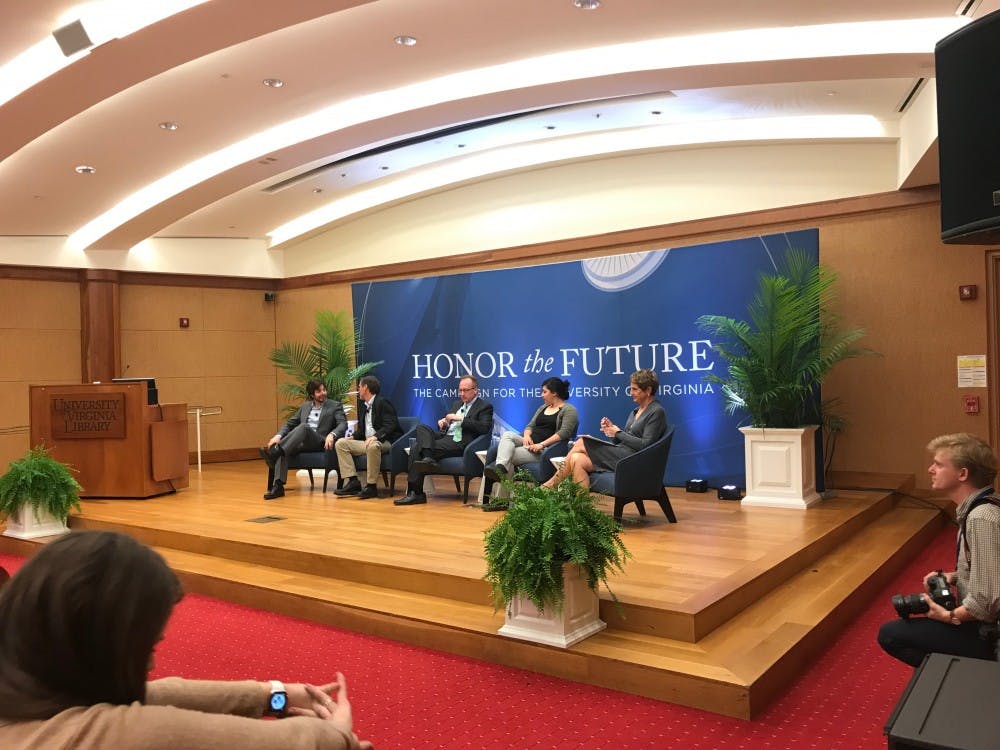The University’s Honor the Future Campaign began Saturday morning with an academic panel discussing the impact of data analysis research on the financial market and how the University is preparing students to enter the field of finance. The panel was part of a larger series of events on Grounds aimed at helping donors choose which aspects of University President Jim Ryan’s “Good and Great” 10-year strategic plan to fund. About 40 people were in attendance.
Alice Handy — founder of Investure, an investment management firm — moderated an hour-long discussion between Asst. Darden Prof. Michael Albert, McIntire Prof. Michael Gallmeyer, Narges Tabari — research scientist at the Data Science Institute — and Engineering Prof. William Scherer.
Scherer repeatedly praised the University’s initiative to produce well-rounded, liberal arts educated students. Gallmeyer supported this view by commending the broad liberal arts background of the University and commenting on students’ abilities to think outside the box.
The panelists agreed that a liberal arts mindset, paired with the tools of analytical technologies — such as machine learning models — was a strong asset for students to have in order to successfully tackle problems in the financial market.
Albert spoke to how the University is equipping students with these tools through the McIntire School of Commerce, Darden School of Business and the newly-established School of Data Science. He pushed back on some of the negative remarks aimed at machine learning models, such as their inability to accurately predict market volatility.
“I actually think that those tools are incredibly powerful and informative … used in the right context,” Albert said. “We’re equipping our students to take advantage of these modern tool sets and hopefully giving them the caveats associated with those tasks as well.”
Scherer commented on how the University is pioneering the use of these models with the recent development of the School of Data science. He remarked that finance requires the “hardest application” of these new technologies in order to solve problems and develop successful market strategies.
Albert commented on how his students are interested in studying the evolution of the market structure. By applying machine learning algorithms, Albert said students can run tests to observe what structure models might help lessen market volatility.
Machine learning models allow researchers to input data into algorithms that then generate what real-life financial situations should look like.
Ensuring that University students are equipped to ask the correct questions when approaching financial problems was a main focus of the panelists’ discussion.
The panelists also discussed the difficulty data analysis technologies have in predicting the behaviors of the human system. Scherer remarked that even as the technology continues to develop, the people influencing the market have not changed. This prevents machine learning algorithms from accurately predicting the volatility of the financial market.
“It’s a stochastic process that’s not repeating,” Scherer said. “There’s never been one month that looks like any other month, there will never be, and so it makes modeling incredibly difficult.”
Tabari added that conditions as fickle as political developments on social media can have large effects on market volatility, making it difficult to develop accurate analytical technologies. Gallmeyer furthered this point on the unreliability of predictions later in the discussion with a remark market time, figuring out when to get in and out of the market.
“Even if you could figure out we’re in a stressed economy, it’s hard to get that timing right,” Gallmeyer said.





